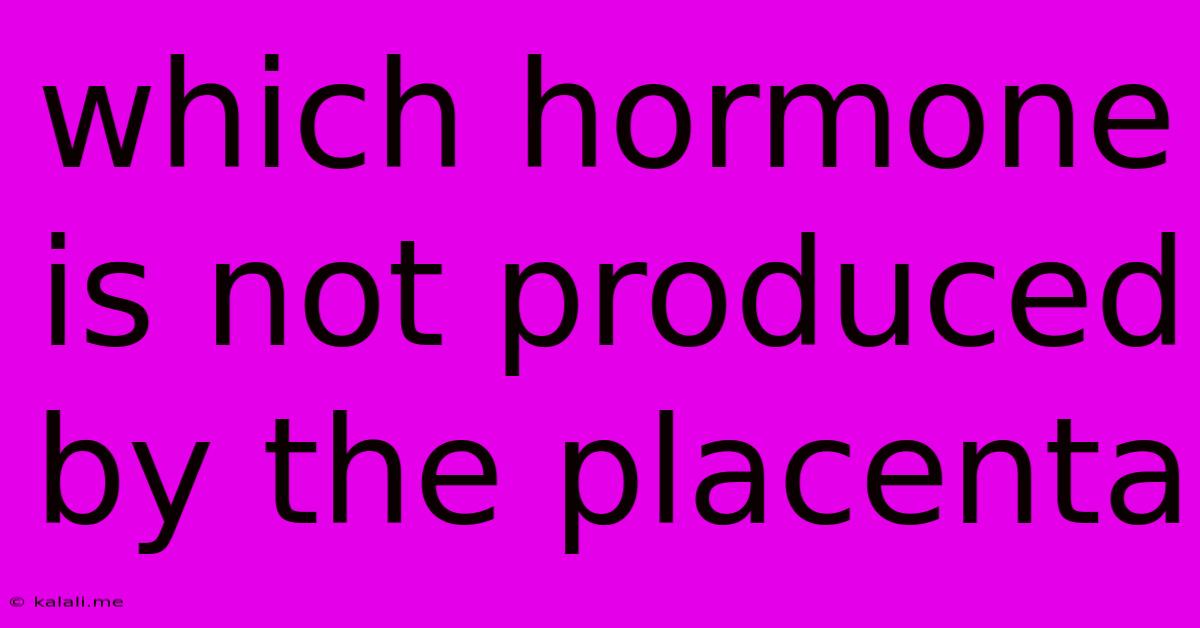Which Hormone Is Not Produced By The Placenta
Kalali
Jun 14, 2025 · 2 min read

Table of Contents
Which Hormone is NOT Produced by the Placenta? A Comprehensive Guide
The placenta, a temporary organ crucial during pregnancy, plays a vital role in supporting fetal development. It acts as a bridge between the mother and the fetus, facilitating nutrient exchange and waste removal. Many hormones are produced by this remarkable organ, contributing significantly to the physiological changes experienced during pregnancy. However, not all hormones are synthesized by the placenta. This article will delve into which hormone isn't produced by the placenta and explore the intricacies of placental hormone production.
Understanding Placental Hormones and Their Functions:
The placenta produces a wide array of hormones essential for pregnancy maintenance and fetal growth. These include:
- Human Chorionic Gonadotropin (hCG): This hormone is famously detected in pregnancy tests. It signals the presence of a developing embryo and maintains the corpus luteum, crucial for early pregnancy progesterone production.
- Progesterone: Essential for maintaining the uterine lining and preventing premature contractions.
- Estrogen: Contributes to uterine growth, breast development, and other pregnancy-related changes.
- Human Placental Lactogen (hPL): Prepares the breasts for lactation and influences maternal metabolism.
- Relaxin: Soften the cervix and ligaments in preparation for childbirth.
The Hormone NOT Produced by the Placenta: Antidiuretic Hormone (ADH) or Vasopressin
While the placenta produces numerous hormones, it does not produce antidiuretic hormone (ADH), also known as vasopressin. ADH is primarily synthesized by the hypothalamus in the brain and stored in the posterior pituitary gland. Its primary function is to regulate water balance in the body by increasing water reabsorption in the kidneys.
ADH plays a vital role in maintaining fluid balance both during and outside of pregnancy. Changes in ADH levels during pregnancy are primarily regulated by the mother's own hormonal system and not directly influenced by the placenta.
Why is this distinction important?
Understanding which hormones are and are not produced by the placenta is crucial for:
- Diagnosing pregnancy complications: Abnormal hormone levels can indicate potential issues. For example, low levels of progesterone can increase the risk of miscarriage.
- Managing pregnancy: Hormone replacement therapy may be necessary in cases of hormonal deficiencies.
- Understanding physiological changes during pregnancy: Knowing the source of various hormones helps understand the complex interplay of maternal and fetal systems.
Other hormones largely influenced by the mother's system and not directly produced by the placenta include:
- Insulin: Primarily produced by the pancreas. Although placental hormones influence insulin sensitivity, the placenta does not synthesize insulin.
- Thyroid Hormones: Primarily produced by the thyroid gland. While the placenta transports thyroid hormones to the fetus, it doesn't produce them.
In conclusion, while the placenta is a prolific hormone producer, essential for a successful pregnancy, it does not synthesize antidiuretic hormone (ADH). This hormone is regulated by the mother's hypothalamus and pituitary gland, highlighting the intricate interplay of hormonal systems during pregnancy. Further research into placental hormone function continues to deepen our understanding of this complex and vital organ.
Latest Posts
Latest Posts
-
Which Of The Following Is True About Rocks And Minerals
Jun 14, 2025
-
Least Common Multiple Of 8 12 15
Jun 14, 2025
-
How Many Electrons Does Oxygen Have In Its Outermost Shell
Jun 14, 2025
-
Best Words To Describe Your Mom
Jun 14, 2025
-
What Is The Root Of 289
Jun 14, 2025
Related Post
Thank you for visiting our website which covers about Which Hormone Is Not Produced By The Placenta . We hope the information provided has been useful to you. Feel free to contact us if you have any questions or need further assistance. See you next time and don't miss to bookmark.